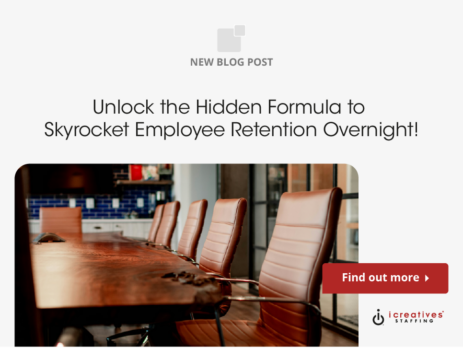Unlock the Hidden Formula to Skyrocket Employee Retention Overnight
In today’s competitive business environment, retaining top talent is more crucial than ever. Companies are constantly seeking strategies to not only attract skilled employees but also to keep them long-term. Employee retention is pivotal for maintaining the stability and growth of a business, reducing turnover costs, and building a strong organizational culture. The key to skyrocketing employee retention overnight lies in understanding the core needs and motivations of employees, coupled with strategic initiatives that foster engagement and satisfaction.
Firstly, it’s essential to recognize that employee retention starts with the hiring process. Hiring the right fit for the role and the company culture can prevent numerous issues down the line. Once onboard, employees need to feel valued and understood. This involves more than just competitive salaries; it encompasses opportunities for professional growth, recognition, and a positive work environment. Moreover, leadership plays a critical role in retention. Leaders who are approachable, fair, and supportive tend to inspire loyalty among their teams.
Furthermore, the modern workforce often looks beyond financial incentives. Work-life balance, remote work options, and wellness programs are increasingly important to employees. Companies that adapt to these evolving expectations are more likely to retain their staff. Additionally, regular feedback and open communication channels between employees and management can help identify and address grievances before they lead to resignations.
Lastly, fostering a sense of community and shared purpose can significantly enhance employee retention. When employees feel that they are part of something larger, they are more likely to stay committed and motivated. Implementing team-building activities, celebrating achievements, and ensuring that employees understand how their work contributes to the company’s goals are all effective strategies in this regard.
What are the immediate actions a company can take to improve employee retention?
How does company culture influence employee retention?
What role does employee engagement play in retention strategies?
Can flexible work arrangements significantly impact employee retention?
How important are career development opportunities in retaining employees?
What are the immediate actions a company can take to improve employee retention?
To enhance employee retention effectively and swiftly, companies can implement several strategic actions. These include:
- Quick Feedback and Resolution: Implement a system for immediate feedback and quick resolution of issues. This shows employees that their concerns are taken seriously and can prevent dissatisfaction from growing.
- Recognition Programs: Develop instant recognition programs to appreciate and reward employees for their hard work and achievements. This can boost morale and encourage continued excellence.
- Competitive Benefits: Review and adjust compensation and benefits packages to ensure they are competitive within the industry. This can include health benefits, retirement plans, and bonuses.
- Professional Development: Offer opportunities for professional development and career advancement. This not only helps in retaining talent but also in attracting ambitious professionals.
- Work-Life Balance: Promote a healthy work-life balance through flexible working hours, remote work options, and sufficient time off. This can significantly increase job satisfaction and loyalty.
- Engagement Surveys: Conduct regular engagement surveys to gauge employee sentiment and identify areas of improvement. This proactive approach can help in making necessary adjustments before issues escalate.
- Onboarding Process: Enhance the onboarding process to make new employees feel welcomed and valued from day one. A strong start can set the tone for employee experience.
- Communication Channels: Establish open lines of communication between employees and management. This fosters transparency and trust, crucial for retention.
- Team Building: Organize regular team-building activities to strengthen relationships among employees. A cohesive team is more likely to enjoy their work environment and stay longer.
- Exit Interviews: Conduct exit interviews to learn why employees leave and use this information to improve retention strategies.
By taking these immediate actions, companies can create a more supportive and appealing work environment that significantly enhances employee retention rates.

How does company culture influence employee retention?
Company culture is the backbone of employee retention. It encompasses the values, behaviors, and practices that characterize an organization. A positive and strong company culture can attract top talent and more importantly, keep them engaged and committed to the company. Here’s how company culture plays a pivotal role in employee retention:
- Values Alignment: Employees are more likely to stay with a company whose values align with their own. This alignment fosters a sense of belonging and purpose, crucial for long-term retention.
- Positive Work Environment: A culture that promotes positivity, respect, and inclusivity can significantly enhance job satisfaction, which in turn, boosts retention.
- Recognition and Reward: Cultures that regularly acknowledge and reward employees’ efforts create an environment of appreciation that encourages loyalty.
- Transparency and Trust: A transparent culture that fosters trust between employees and management can lead to higher retention rates. Employees feel secure when they believe management is honest and open.
- Innovation and Flexibility: Companies that cultivate a culture of innovation and flexibility adapt more quickly to changes in the market and employee expectations, such as the increasing demand for work-life balance.
- Leadership Style: The leadership style that permeates an organization deeply influences its culture. Leaders who are supportive, communicative, and lead by example tend to inspire and retain their teams.
- Community and Social Connections: A culture that encourages social connections and builds a sense of community at work can enhance employee retention. When employees form friendships at work, their job satisfaction and loyalty increase.
- Feedback and Development: Cultures that prioritize continuous feedback and development opportunities help employees grow and feel valued, which can significantly reduce turnover.
- Work Autonomy: Cultures that trust employees with autonomy in their work can lead to higher job satisfaction and retention. Employees feel empowered when they are trusted to make decisions.
- Conflict Resolution: A culture that effectively manages and resolves conflicts can maintain a harmonious work environment and prevent negative fallout that leads to turnover.
In essence, a robust company culture not only attracts the right talent but also plays a crucial role in retaining them by creating a supportive and engaging work environment.
What role does employee engagement play in retention strategies?
Employee engagement is a fundamental element in the framework of retention strategies. Engaged employees are those who are committed to their work and the goals of the organization, and who feel passionate about their roles. Here’s how employee engagement directly impacts retention:
- Job Satisfaction: Engaged employees typically experience higher job satisfaction, which is a critical factor in their decision to stay with an organization.
- Productivity and Performance: Higher engagement leads to better productivity and performance, which can lead to more opportunities for rewards and recognition, further enhancing retention.
- Company Loyalty: Engaged employees feel a deeper loyalty to their company, making them less likely to leave for competitors.
- Positive Workplace Relationships: Engagement often correlates with positive interactions among colleagues, contributing to a pleasant work environment that employees are reluctant to leave.
- Reduced Absenteeism: Engaged employees are generally more present and punctual, as they feel a strong sense of responsibility towards their roles and team.
- Feedback and Improvement: Engaged employees are more likely to participate in feedback mechanisms, providing valuable insights that can help improve business processes and workplace culture.
- Alignment with Goals: Engagement ensures that employees are aligned with the company’s goals, making them key players in achieving those objectives, and less likely to seek opportunities elsewhere.
- Crisis Management: In times of crisis, engaged employees are more likely to contribute to problem-solving and innovation, helping the company to stabilize and grow, which in turn secures their loyalty.
- Advocacy: Engaged employees often become advocates for their companies, positively influencing their peers and improving overall company morale.
- Lower Turnover Costs: Ultimately, high employee engagement leads to lower turnover, which reduces the costs associated with hiring and training new staff.
Fostering employee engagement is thus not just about making employees happy in the short term, but about integrating them into the fabric of the organization, aligning their successes with those of the company, and securing their loyalty and retention long-term.
Can flexible work arrangements significantly impact employee retention?
Flexible work arrangements are becoming increasingly important in modern workforce management, and they have a significant impact on employee retention. Flexibility in work can take many forms, including remote work options, flexible hours, and compressed workweeks. Here’s how these arrangements contribute to retaining employees:
- Work-Life Balance: Flexible work arrangements help employees better manage their work and personal lives, leading to higher job satisfaction and retention.
- Employee Autonomy: Offering flexibility can enhance feelings of trust and autonomy among employees, making them feel valued and respected.
- Attracting Talent: Flexibility can make a company more attractive to potential employees, particularly millennials and Gen Z who prioritize such benefits.
- Reducing Burnout: Flexible schedules can help prevent employee burnout by allowing workers to work when they are most productive and take time off when needed.
- Inclusivity: Flexibility can support a more diverse workforce, including parents, caregivers, and those with different lifestyle needs, thereby enhancing retention.
- Employee Health: By reducing the stress associated with rigid work schedules and long commutes, flexible arrangements can improve overall employee health and well-being.
- Loyalty: Companies that offer flexibility are often seen as caring and supportive, which can foster employee loyalty.
- Adaptability: In times of unexpected personal or global crises, flexible work arrangements allow businesses to maintain operations and keep employees engaged.
- Cost Savings: For some companies, flexible work arrangements can reduce overhead costs (like office space), and these savings can be redirected to other retention programs.
- Environmental Impact: Flexibility can reduce commuting, which not only benefits the environment but can also enhance the company’s image as a socially responsible employer.
Implementing flexible work arrangements can thus significantly boost employee retention by addressing key aspects of work-life balance, health, and overall job satisfaction.

How important are career development opportunities in retaining employees?
Career development opportunities are crucial in retaining employees, especially in a landscape where career growth is often cited as a primary reason for job switching. Here’s how providing paths for advancement can impact retention:
- Professional Growth: Employees are more likely to stay with a company that invests in their professional development and offers clear pathways for advancement.
- Motivation: Career development opportunities keep employees motivated and engaged, as they feel their careers are progressing.
- Talent Attraction: Organizations known for offering career advancement are more attractive to top talent, who often prioritize personal and professional growth.
- Reduced Turnover: When employees see a future within the company, they are less likely to look for opportunities elsewhere.
- Skill Enhancement: Continuous learning and development help employees enhance their skills, making them more valuable to the organization and boosting their self-esteem.
- Innovation: Employees who are encouraged to grow are more likely to innovate, bringing new ideas and approaches that can benefit the company.
- Succession Planning: Developing employees for future roles ensures leadership continuity and reduces the risks associated with turnover in key positions.
- Competitive Advantage: Companies that invest in employee development are often ahead of the curve in adopting new technologies and practices, keeping them competitive in the market.
- Employee Advocacy: Employees who are satisfied with their growth opportunities are more likely to advocate for the company, attracting more talent.
- Cultural Reinforcement: A culture that promotes and supports ongoing learning and development contributes to overall positive employee morale and retention.
Offering career development opportunities is therefore not just a perk but a strategic tool in retaining talented employees and ensuring the long-term success of the organization.
Conclusion
Skyrocketing employee retention overnight requires a multifaceted approach that addresses various aspects of the employee experience. Immediate actions such as improving feedback mechanisms, enhancing recognition programs, and offering competitive benefits are crucial. Additionally, fostering a positive company culture, engaging employees deeply, providing flexible work arrangements, and offering career development opportunities are all strategic moves that can significantly boost retention.
Each of these strategies not only helps in retaining talent but also in building a more robust, motivated, and committed workforce. By focusing on these areas, companies can create a work environment where employees feel valued, supported, and part of a larger purpose. Ultimately, the success in retaining employees lies in understanding and addressing their needs, aspirations, and well-being, which in turn drives the overall success of the organization.
In today’s competitive market, finding the right creative and marketing expert can be a challenge. But with icreatives, you’re in experienced hands. With 37 years in staffing and a track record of matching more than 10,000 employees to over 1,000 companies worldwide, we know how to connect you with the best. Plus, you only pay if you hire—there’s no risk, only results.Ready to find your perfect creative or marketing expert? HIRE WITH ICREATIVES today!












